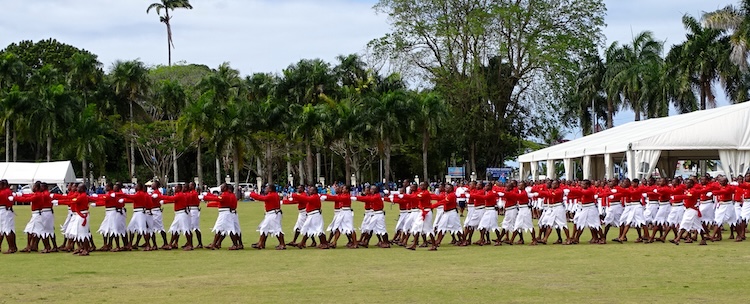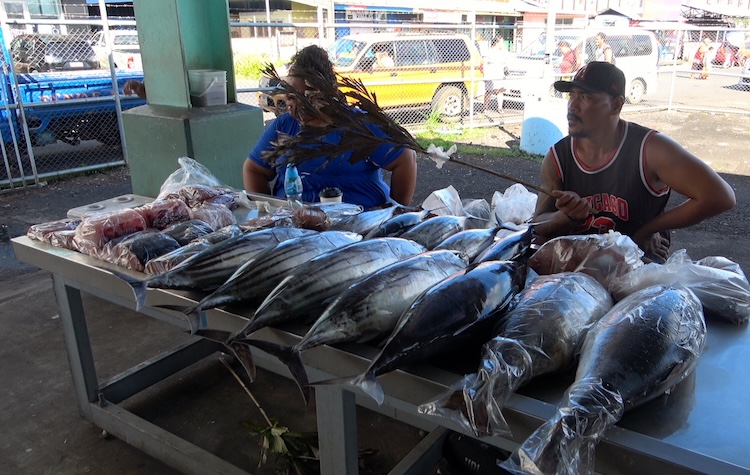By Kalinga Seneviratne
SYDNEY | 8 September 2024 (IDN) — At the recent Pacific Island Forum (PIF) meeting in Tonga, the regional leaders adopted a controversial agreement known as the ‘Pacific Policing Initiative’ (PPI), which seems focused on blocking China from participating in any security arrangements in the vast South Pacific Ocean region.
Typhoons and Cyclones, which are becoming more frequent than before, are devastating the livelihood and food security of Pacific Island nations. Their leaders have repeatedly emphasized at international forums, such as the annual Shangri-La Dialogue in Singapore, that their main security issue is Climate Change, not military threats.
Yet, the PPI announced at PIF’s annual leaders’ summit in Tonga late last month (27– 30 August) only has vague references to it. The PPI was the major agreement to come out of last week’s PIF leaders’ summit in the Tongan capital of Nuku’alofa.
The initiative will have three core pillars—the creation of a central police development and coordination hub in Brisbane, Australia; four police training “centers of excellence” throughout the region; and a new “Pacific Police Support Group.”
The latter is to be a multinational force that can be deployed in response to regional emergencies like national disasters, transnational crimes such as drug trafficking, and other major events, such as at election time across the region.
At a press conference in Nuku’alofa, four Pacific countries and Australia were eager to present this as a “Pacific initiative” and not something imposed by Australia, even though Canberra will provide the funding.
Australian Prime Minister Anthony Albanese was at pains to emphasize that this is not a project imposed by Australia. “This is a Pacific-led initiative, very importantly. This is something that has arisen from the Pacific family to look after the Pacific family,” Albanese said addressing the press conference. However, Canberra holds a disproportionate sway in the 18-member PIF, a type of big brother position because of its size, wealth, and defense alliance with the United States.
James Marape, Prime Minister of Papua New Guinea (PNG) made no secret of the fact that with this initiative, Pacific Island countries have got into a partnership with our “security partner of choice,” he said, adding, “the entire Pacific is the biggest unpoliced space in planet earth (and) it is really important that we come together in this manner”.

Fiji’s Prime Minister Sitiveni Rabuka, without naming any countries, said, that “the rest of the world, we believe, are targeting our region. So it’s our responsibility to develop our own policing initiative”.
Rabuka, who has just come back from a ten-day official visit to China, praising its technological progress, and signing many development cooperation agreements, hinted at a press conference in China that he may seek Chinese assistance to improve Fiji’s harbours. Australia (and the US) see such Chinese assistance in the Pacific as designed to develop naval bases in the region.
Australia’s national broadcaster ABC said that “Australia has notched a strategic victory in the Pacific” after the PIF leaders endorsed the new initiative “to reshape policing across the region”. Yet, it pointed out that Vanuatu Prime Minister Charlot Salwai and the director-general of the Melanesian Spearhead Group, Leonard Louma have used identical language in questioning the PPI’s motives[1].
Louma, while calling the PPI a “worthy initiative” also said some of the aspects of the plan were “cryptic”. He suggested that Australia and New Zealand could be intent on using the initiative to try and lock out strategic opponents like China, which has been pushing to sign a suite of security and policing agreements across the region. The PPI needs to “fit our purposes and not conveniently developed as part of the geo-strategic denial security doctrine of our big partners,” he said.
With only three countries—PNG, Fiji, and Tonga —having a military, police training has been an area of competition with Australia playing a major role in the training of police forces in the region. But, China has become a player in recent years as well with some half a dozen programs in the region such as with Solomon Islands, Fiji, and Tonga. Civil society groups and experts have raised concerns about the militarization of the region, citing the 2022 security deal between China and Solomon Islands, and the US defense cooperation agreement with Papua New Guinea agreed upon a year later[2].

Under heavy pressure by Australia and its Western allies, 10 Pacific Island nations declined to sign a new regional economic security deal with China, that was presented by the Chinese Foreign Minister Wang Yi at a China-Pacific Islands Foreign Ministers’ meeting in Fiji in June 2022. Before traveling to Fiji just before this meeting, Australia’s Foreign Minister Penny Wong told ABC: “China has made its intentions clear. So too are the intentions of the Australian government. We want to help build a stronger Pacific family.[3]”
In Tonga last week, Albanese faced a barrage of questions from journalists at a media briefing regarding a conversation he had with US Deputy Secretary of State Kurt Campbell. Radio New Zealand (RNZ) journalist Lydia Lewis while filming cut-away shots at a leader’s informal meeting opened to the media, recorded Albanese bragging to Campbell about Australia getting a “cracker” about PPI, and that the initiative would make “such a difference” in the Pacific. Campbell in response was heard to be saying that the plan was “fantastic,” adding that the US had been contemplating a similar initiative until Australia’s ambassador to the US Kevin Rudd asked them not to. Albanese then jokingly told him, the US could now share the costs of the initiative with Australia.
When questioned about this conversation by journalists, an irritated Albanese claimed that it was a “private conversation” with a good friend and the journalists need to “think about their own ethics when it comes to journalism,” which should raise questions about whether Australia really believes in the “watchdog” role of the media in making governments accountable – which Australians are fond of lecturing about to the Pacific and Asian countries. In a statement, RNZ defended its journalist saying: “There is nothing to suggest they acted unethically or outside of our rigorous editorial policies.”
With PPI taking centre stage, addressing climate change and de-colonization of the French-occupied territory of New Caledonia, where rioting by indigenous Kanakys has taken place in recent months, has been pushed to the back burner. Statements by Pacific leaders on PPI focused on tackling increasing drug trafficking, cybercrime, human trafficking, and illegal fishing in the region, areas where the Australian media has often pointed fingers at the Chinese.
In the final communiqué[4] of the 53rd PIF summit, climate change was referred to in only 11 of the 75 clauses, with the last clause calling for sea-level rise to be included as a standalone agenda item in the United Nations General Assembly. No additional funding was committed to climate change programs, but Australia committed AUD 400 million (USD 270 million) for the Pacific policing program. [IDN-InDepthNews]
Photo: Tuvalu Defense, a defense against sea level rise built in Tuvau under a multi-million-dollar UNDP project. It is designed to protect the capital Funafuti from flooding due to sea level rise. Credit: Kalinga Seneviratne
[1] https://www.abc.net.au/news/2024-08-28/vanuatu-melanesia-officials-warn-policing-could-block-china/104277614
[2] https://www.theguardian.com/world/article/2024/jul/09/pacific-islands-security-deals-australia-usa-china
[3] https://www.abc.net.au/news/2022-05-25/china-seeks-pacific-islands-policing-security-cooperation/101099978
[4] https://forumsec.org/publications/reports-communique-53rd-pacific-islands-leaders-forum-2024


